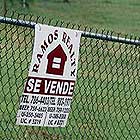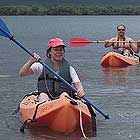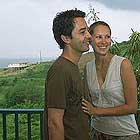|
 |
|
Esta página no está disponible en español. Orlando Sentinel New Type Of Boom Hits Island By Iván Román | San Juan Bureau June 4, 2003
VIEQUES, Puerto Rico -- Michele Bullard listened to the gentle splash of waves rolling onto sand as she sunbathed on the island's Navío Beach. The rhythm of the sea no longer had to compete with the distant rumble of military bombing. It was the newfound tranquility on Bullard's tropical getaway, where the U.S. Navy operated a bombing range for six decades, that clinched her recent decision to buy property here. On May 2 -- a day after the Navy formally shipped out -- Bullard and two friends pounced on the Caribbean's latest real-estate hot spot, buying land for a vacation home. "People realize that with the military gone, there's such an opportunity," said Bullard, 38, who runs a Cape Cod, Mass., restaurant. "We just bought a big piece of land with a phenomenal view." Now marketed as one of the "Spanish Virgin Islands," this island without a single stoplight off Puerto Rico's eastern shore is in danger of losing its reputation as one of the Caribbean's best-kept secrets. "We try to keep it quiet," said Jilda Schaffer, 55, also a Cape Cod restaurateur and future housemate of Bullard's. A glance down the beach shows why -- only two other people are visible, lounging under a sea grape tree. "We don't want it to change that much." They may not get their wish. Now bomb-free, with an expansive shoreline and one of the brightest bioluminescent bays in the world, Vieques is a desirable place to be. Until recently, the Navy owned three-quarters of the 52-square-mile island, using it since World War II for target practice. Now the U.S. Fish and Wildlife Service will transform most of it into a wildlife refuge with public access to dozens of white-sand beaches and crystal waters. In the civilian area sandwiched between refuges, residents of the U.S. mainland and Puerto Rico are snapping up properties. Many Puerto Ricans with family ties to Vieques are returning to the island to open businesses in anticipation of the boom. Rush began in January With just 9,400 residents concentrated on 12 square miles, the wave of arrivals is easy to see. The first sparks of the heated market came in mid-January, when the Navy formally announced its departure. "It's been astonishing. Starting that day, there was a land rush," said Lin Wetherby, a real estate agent who had to hire a broker to keep up. "People call now saying they're coming for four days and they want to leave the island with a contract. I tell them: 'Do you have your checkbook? If you don't, I don't have time.' " While the island lacks the kind of record keeping that could put hard numbers to the trend, the evidence is abundant. The phenomenon is raising eyebrows among the locals, who -- after picketing, protesting and going to jail to get the Navy out -- worry that a land rush will end up pricing their children out of a home. Old issues still simmer: Residents want the military to scour the island and clean up contamination from decades of maneuvers, which locals insist have brought health problems. And now there is a new issue: fighting against what some see as a land grab by "outsiders," as locals call them, with cash to spend. "It's terrible to think of what's coming in the future on an island that doesn't even have a traffic light," said Charlie Connelly, a longtime Vieques journalist and community leader. Like other islands in the Caribbean, a friendly but sometimes uneasy relationship exists between descendants of local families with roots dating to the 19th century and U.S. mainlanders fleeing the rat race. With some notable exceptions, mainlanders control Vieques' low-key tourism industry, which grew slowly as visitors flocked to the neighboring Puerto Rican island of Culebra. Public and private investment passed by Vieques as long as the bombing range was active. Now people with cash can't get here fast enough. Investors want alternative Jane Sabin, the island's veteran real estate broker, has seen her business jump about 20 percent this year as heirs to family properties have suddenly put them up for sale. Investors looking for an alternative to the lackluster stock market also are playing a role in the boom, she said. While a new Wyndham luxury resort brought much-needed jobs to the island, most want to keep big resorts from shaping Vieques' future.
They hope to position Vieques as a laid-back retreat, perhaps filled with hillside vacation homes and guest cottages that capitalize on the island's undeveloped beauty. "At this stage, local people are definitely interested in promoting tourism as a way to develop Vieques," said Sabin, who moved here in 1987 after a nasty winter in Massachusetts. "I don't think anyone wants it to be overdeveloped, though. It lends itself to eco-tourism. It's a nice, quiet, beautiful island -- and we want it to stay that way." Wetherby, another Massachussetts transplant, was brokering one sale a month before the boom. Now she's signing contracts every week, and her portfolio of properties is the largest it has ever been. For years, prices on the island remained fairly stagnant. But that all changed after January. A small apartment complex valued at $435,000 leaped to $635,000 in January, up 46 percent. A four-bedroom, three-bath home went from $229,000 to $270,000, up 18 percent. And a 2-acre lot that sold for $225,000 not long ago is now on the market for $270,000. People can add anywhere from $20,000 to $100,000 or more to what their property would have fetched just a few months ago, depending on its view of the Atlantic Ocean or Caribbean Sea. "This will double in value in three to five years. I know it," Wetherby said. "I'm also investing here. I'm buying land here myself. I see Vieques as an incredible investment opportunity." Sunsets attract couple Filippa and Franck Sarrabezolles hope so. Spectacular sunsets sold them on an overgrown 2.5 acres, where they hope to build their dream home.
The view -- the eastern coast of the main island of Puerto Rico is visible 20 miles away -- convinced the Manhattan advertising executive and his model wife to stretch their budget and pay $120,000. "People wave at you and they're really friendly," said Filippa Sarrabezolles, 31, a native of Sweden who speaks Spanish and three other languages. "I've always imagined having kids on an island. I think it's a great way for kids to grow up." She and her husband heard about Vieques three years ago. They fell in love with the island unspoiled by golf courses and casinos. But Franck Sarrabezolles, 35, knows that could change soon. "I'm sure it can turn into a place that land can be out of reach to the locals, and that's unfortunate," said the Frenchman, who also speaks Spanish. Mindful of the danger, Vieques residents now fret over land speculators. There is a sense of urgency about protecting Vieques from the fate of tourism-dependent islands such as St. Thomas, St. Croix or Culebra, where developers and outsiders snatched up the best land after the Navy stopped bombing there in the 1970s. Vieques lovers are looking for ways to preserve the island's character while protecting locals from gentrification and price escalation. "Most of the houses now are expensive and my son, who is looking for a house, is having a hard time," said Zaida Torres, a nurse who campaigned to close the Vieques bombing range. "I worry about it because [outsiders] are always going to buy the best land and they always have the money." City officials have hired a planner for the first time and are gathering ideas for managing the growth looming on the horizon. "In places like Vieques, this speculation happens," said Fabián Martínez, city director of federal programs, who returned to the island a few years ago. "It's something we want to prevent as much as we can, so that's why we're working fast on this development plan." Like Martínez, others with family ties to Vieques are moving here. Marcos Villanueva arrived before this rush began. A native of Brooklyn's Park Slope in New York City, he moved to Vieques last August to claim the home where his grandparents lived. His grandfather was a merchant who bought Caribbean silk, beads and other goods to sell out of the largest home then overlooking Isabel Segunda's main bay. Now the driveway is packed with 22 scooters rented to tourists, who dodge horses grazing on roadsides and motor through tropical brush to hidden beaches. All the scooters are booked through June. "When I told my friends in New York I was going to Vieques, they thought I was crazy," said Villanueva, 37, who opened Extreme Scooter Rentals here last August. "I make just as good if not better money and the stress is much less. My biggest decision every day is figuring out where I'm going to eat breakfast."
|

 Sign of the times.
Sign of the times.  Island tranquility.
Island tranquility.  Planning a home.
Planning a home.